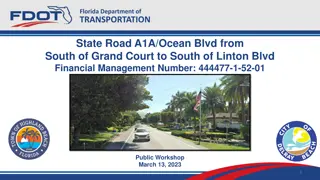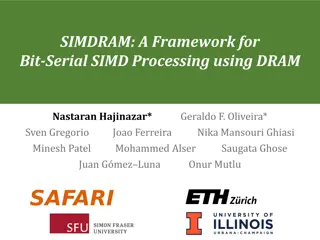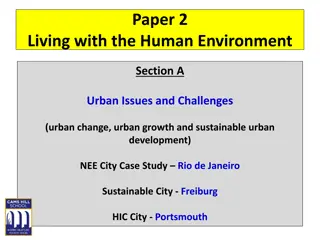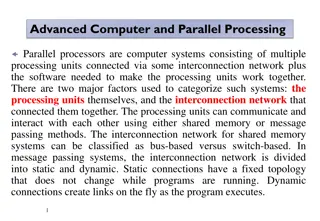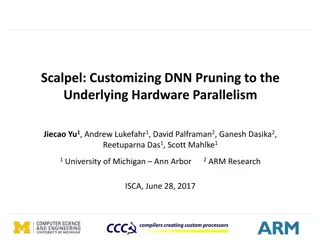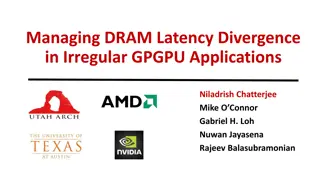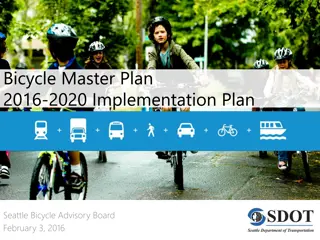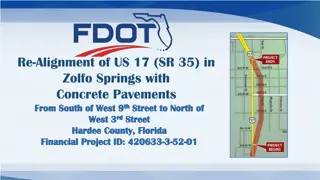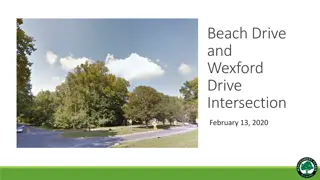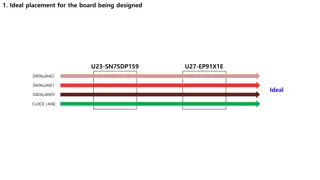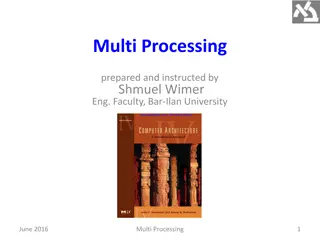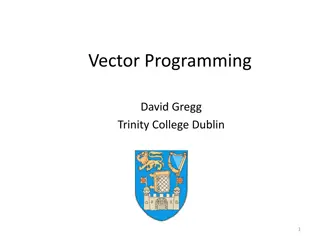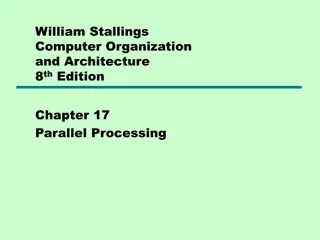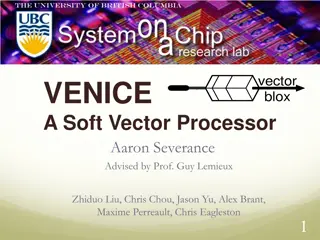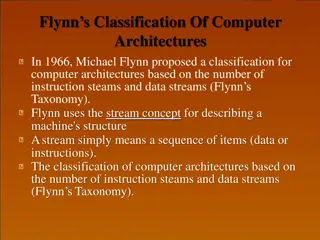YMCA of Greater Richmond Head Clerk of Course Training Guide
This training guide provides detailed information on the responsibilities of a Head Clerk of Course at YMCA of Greater Richmond, including setting up and starting meets, organizing individual events and relays, troubleshooting, and more. It covers the process of seeding swimmers in heats and lanes,
0 views • 15 slides
Florida Department of Transportation Project Overview
The Florida Department of Transportation is conducting a project on State Road A1A/Ocean Blvd from South of Grand Court to South of Linton Blvd. The project aims to resurface roadway pavement, widen shoulders for bicycles, improve drainage, upgrade signage, and extend left turn lanes. The project le
0 views • 14 slides
BUSINESS STAKEHOLDER MEETING
Main Remade is a project by the Kentucky Transportation Cabinet aimed at improving safety and accessibility on Main Street in downtown Louisville. Key features include converting one-way streets to two-way, adding protected bike lanes, and upgrading crosswalks. The project will be implemented in thr
0 views • 25 slides
Indian Restaurants Florida
Take a spin on India's rich culinary whe\u00adel right in the heart of Florida's buzzing dining are\u00adna. Indian eateries he\u00adre swirl you through the spice-sce\u00adnted lanes of the Indian subcontine\u00adnt. From Orlando's bustling lanes to Jacksonville's seaside\u00ad allure, these place\
0 views • 4 slides
Simplified Process Mapping Templates and Shapes
Comprehensive instructions and templates for initiating a process map, with clear shapes for visualizing start decisions, activities, inefficiencies, and more. Includes options for utilizing swim lanes to enhance organization and clarity.
0 views • 4 slides
Understanding Traffic Lane Width Variation in Curve Bridge Design
In curve bridge design, traffic lane width may vary, requiring proper consideration of surface lanes for defining traffic lanes. Non-square elements, like triangular plates, may be used at deck ends due to geometric limitations. Different mesh local axes may be needed for square and non-square eleme
0 views • 15 slides
SIMDRAM: An End-to-End Framework for Bit-Serial SIMD Processing Using DRAM
SIMDRAM introduces a novel framework for efficient computation in DRAM, aiming to overcome data movement bottlenecks. It emphasizes Processing-in-Memory (PIM) and Processing-using-Memory (PuM) paradigms to enhance processing capabilities within DRAM while minimizing architectural changes. The motiva
2 views • 14 slides
Efficient Food Service Management Strategies
Designing an effective layout in food service management involves ensuring a smooth flow of work from ingredient receipt to serving guests. It includes considerations like traffic lanes, work aisles, goods receiving facilities, and storage space allocation. By following these guidelines, kitchens ca
0 views • 47 slides
Sustainable Urban Transport Scheme in Freiburg, Germany
Freiburg, Germany, has effectively implemented an integrated urban transport plan, including a 30 km tram network and extensive cycle lanes, to reduce traffic congestion, pollution, and fossil fuel use. With affordable tram fares and seamless connections to bus routes, the city has seen a significan
0 views • 20 slides
Traffic Flow Improvement at Gate 1 Pilot Project Overview
The Traffic Flow Improvement project at Gate 1 aims to address congestion and safety issues by implementing a one-way traffic flow during peak times. The project involves rerouting traffic, creating designated lanes, and regulating access to optimize traffic movement and reduce the risk of accidents
0 views • 7 slides
Unlocking Douala's Economic Potential Through Cutting-Edge Urban Mobility Project
Douala, Cameroon's main economic hub, faces congestion and inefficiencies in its public transport system. To address these issues, the government, along with donors like the World Bank, is spearheading a comprehensive transport strategy. The project involves creating mass transit corridors with Bus
0 views • 6 slides
An Overview of Traffic Signal Timing Planning
Understanding the process of designing a traffic signal timing plan involves determining lane configurations, proposing phase plans with diagrams, analyzing critical volumes, recommending a phase plan, and incorporating clearance intervals. Key concepts include considering shared LT+TH lanes, using
1 views • 30 slides
Parallel Processing and SIMD Architecture Overview
Parallel processors in advanced computer systems utilize multiple processing units connected through an interconnection network. This enables communication via shared memory or message passing methods. Multiprocessors offer increased speed and cost-effectiveness compared to single-processor systems
3 views • 24 slides
Saida By-Pass Road Project: Solving Traffic Congestion
The Saida By-Pass Road Project aims to alleviate traffic congestion in Saida, Lebanon by creating a bypass road to divert traffic away from the city center. This project will not only improve transportation efficiency but also facilitate economic development and environmental preservation. With a to
1 views • 7 slides
US 31W Nashville Road Project Overview
The US 31W Nashville Road project, presented by District 3's Ben Hunt, aims to increase capacity, ease congestion, and provide a safer roadway for future traffic, pedestrians, and cyclists. The preliminary design was initiated in fall 2017, with funding from the 2018 Highway Plan allocated for right
1 views • 16 slides
Optimizing DNN Pruning for Hardware Efficiency
Customizing deep neural network (DNN) pruning to maximize hardware parallelism can significantly reduce storage and computation costs. Techniques such as weight pruning, node pruning, and utilizing specific hardware types like GPUs are explored to enhance performance. However, drawbacks like increas
0 views • 27 slides
Bicycle Safety and Preventative Measures for Reducing Injuries
Bicycle accidents can be dangerous, but preventative measures like wearing helmets, creating bike lanes, and following safety guidelines can save lives. Understanding the risks, implementing pre, during, and post-event strategies, and promoting environmental changes are key to promoting bike safety.
0 views • 8 slides
GKAISA Coaches Meeting 2019 Highlights
The 2019 GKAISA Coaches Meeting covered important agenda items including membership dues, insurance requirements, mandatory training deadlines, and key dates for upcoming meets. It emphasized pool safety rules, such as one-way lanes during warm-ups and pool depth requirements. Coaches were reminded
0 views • 49 slides
Sitka Sawmill Creek Road Resurfacing and Pedestrian Improvements Project
Alaska DOT&PF is working on the Sitka Sawmill Creek Road Resurfacing and Pedestrian Improvements Project to enhance the road infrastructure. The project includes reconstructing pavement, redesigning intersections, installing a new storm drain system, and improving pedestrian facilities. Proposed opt
0 views • 19 slides
Managing DRAM Latency Divergence in Irregular GPGPU Applications
Addressing memory latency challenges in irregular GPGPU applications, this study explores techniques like warp-aware memory scheduling and GPU memory controller optimization to reduce DRAM latency divergence. The research delves into the impact of SIMD lanes, coalescers, and warp-aware scheduling on
0 views • 33 slides
Understanding SIMD for High-Performance Software Development
SIMD (Single Instruction Multiple Data) hardware support utilizes vector registers for high-performance computing. Vector instructions operate on multiple data elements simultaneously, offering scalability and efficient processing strategies. The use of wide vector registers enhances arithmetic oper
0 views • 41 slides
Seattle Bicycle Master Plan 2016-2020 Implementation Overview
The Seattle Bicycle Master Plan 2016-2020 outlines a comprehensive strategy to improve the city's transportation system by creating a network of protected lanes and greenways. The plan includes specific deadlines, deliverables, funding details, and appendices covering costs, project lists, maps, and
0 views • 14 slides
TN Multimodal Access Grant 2024: Supporting Transportation Infrastructure Projects
The TN Multimodal Access Grant 2024 aims to support the needs of pedestrians, bicyclists, and transit users through infrastructure projects along state routes. Eligible applicants include cities, towns, and counties in Tennessee, with funding awards of up to $1.25 million. Projects examples include
0 views • 12 slides
Understanding Rectangular Waveguides and Cutoff Frequency
Investigate waveguides supporting non-TEM modes like TE and TM, where cutoff frequency is crucial. Rectangular waveguides with TE and TM modes are explored, detailing mode orders and field configurations. The cutoff frequency formula and standard waveguide designations are also discussed, along with
0 views • 7 slides
Dangers of Smartphone Distractions for Pedestrians
Smartphone distractions have led to fatal accidents, prompting measures like in-ground traffic lights in Augsburg, Germany, to protect pedestrians engrossed in their devices. Other cities worldwide are also taking action due to the increasing risks posed by distracted mobile phone users. The introdu
0 views • 8 slides
Re-Alignment of US 17 in Zolfo Springs with Concrete Pavements Project Overview
The project involves realigning a segment of US 17 in Zolfo Springs, Florida, improving corridor safety and infrastructure. Contractor Ajax Paving Industries will construct a concrete roadway with bike lanes, sidewalks, and stormwater management systems. The old US 17 will become Main Street for Zol
0 views • 28 slides
Exploring Hardware SIMD Parallelism Abstraction
Understanding the inherent parallelism in applications can lead to high performance with less effort, but the alignment with how Linux and C++ compilers discover parallelism is crucial. The shift towards making parallel computing more mainstream highlights the importance of SIMD operations and oppor
0 views • 50 slides
Implementation of Pupil Equity Funding at Lundavra Primary
Lundavra Primary in Fort William, opened in 2015, amalgamated from three schools, serves a diverse student population with 15% on free school meals and 19% living in SIMD 2 areas. The implementation process involves identifying gaps through data tracking, analyzing pupil equity data, and addressing
0 views • 15 slides
Community Feedback on Proposed Active Travel Improvements in Hill Lane
Community feedback was gathered regarding proposed active travel improvements in Hill Lane, including segregated on-road cycle lanes and new zebra crossing points. The majority of respondents expressed support for the initiatives, citing increased safety, encouragement for more cycling and walking,
0 views • 29 slides
Intersection Analysis and Improvement Proposal for Beach Drive and Wexford Drive
This analysis delves into the current conditions at the Beach Drive and Wexford Drive intersection, proposing various alternatives for improvement. The evaluation includes crash data, existing peak hours, and potential solutions such as minor improvements, a three-way stop, additional lanes, a round
0 views • 19 slides
Postpartum Hemorrhage Simulation Activity with Swim Lane Mapping
Prepare for a postpartum hemorrhage simulation activity by printing slides, setting up a floor diagram with masking tape lanes, and arranging role members. Watch instructional videos, analyze contributing factors, and place process steps on the diagram. Follow key instructions, identify key actions
0 views • 20 slides
Introduction to OpenMP: A Parallel Programming API
OpenMP, an API for multi-threaded, shared memory parallelism, is supported by compilers like C/C++ and Fortran. It consists of compiler directives, runtime library resources, and environment variables. The history spans various specification versions, with features like tasks, SIMD, and memory model
0 views • 33 slides
Ideal Placement for Board Design with U23-SN75DP159 and U27-EP91X1E
The current status of the board under design includes various components such as resistors, capacitors, and integrated circuits (ICs) like PLL_XFC-2. Connections for TMDS_D2P, TMDS_D2N, TMDS_D1P, TMDS_D1N, TMDS_D0P, TMDS_D0N, and TMDS_CLKP are detailed. Additionally, there are references to HDMI int
0 views • 7 slides
Understanding Multi-Processing in Computer Architecture
Beginning in the mid-2000s, a shift towards multi-processing emerged due to limitations in uniprocessor performance gains. This led to the development of multiprocessors like multicore systems, enabling enhanced performance through parallel processing. The taxonomy of Flynn categories, including SIS
0 views • 46 slides
Understanding SIMD in Computer Architecture
SIMD (Single Instruction Multiple Data) architecture plays a crucial role in optimizing performance for parallel computing tasks. It allows for the simultaneous processing of multiple data elements, enhancing efficiency in various applications. The concept is rooted in executing the same operation a
0 views • 24 slides
Understanding Vector Programming and Machines
Vector programming involves efficient processing of data through SIMD models, parallel computing, and vector extensions in architectures like SSE and AVX. Programming vector machines in C requires addressing challenges with automatic vectorization related to pointers and data layouts.
0 views • 58 slides
Overview of Parallel Processing Architectures
This comprehensive overview delves into the taxonomy of parallel processor architectures, including SISD, SIMD, MISD, and MIMD configurations. It explores the characteristics of each architecture type, such as single vs. multiple instruction streams and data streams. The images provided visually rep
0 views • 76 slides
Exploring Overlay Architecture for Efficient Embedded Processing
The research delves into the implementation of overlay architecture for embedded processing, aiming to achieve optimal performance with minimal FPGA resource usage. It discusses motivations for utilizing FPGAs in embedded systems, the challenges of balancing performance and resource utilization, and
0 views • 24 slides
Flynn's Taxonomy: Classification of Computer Architectures
Michael Flynn's 1966 classification divides computer architectures into SISD, SIMD, MISD, and MIMD based on the number of instruction streams and data streams. SISD corresponds to traditional single-processor systems, SIMD involves multiple processors handling different data streams, MISD has multip
0 views • 10 slides
Understanding Transport Layer Parameters and Examples
This content delves into the important parameters associated with the transport layer, such as the number of lanes per converter device, the number of converters per device, and the number of octets per frame. It provides examples of how these parameters are configured in different scenarios, showca
0 views • 8 slides

